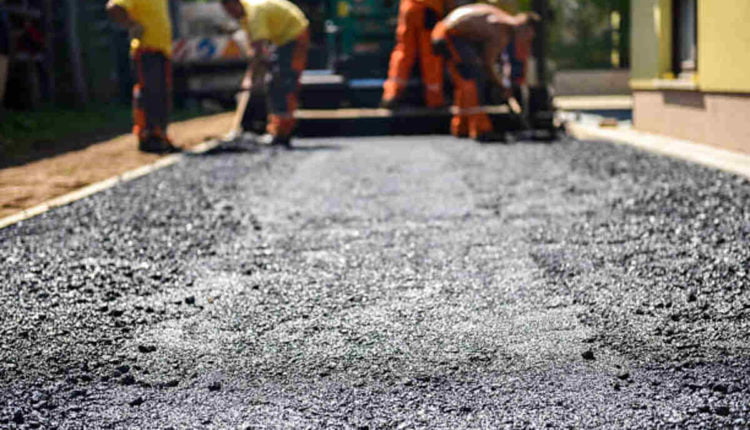Asphalt is a dark-colored, gritty material commonly used to pave roads and driveways. When mixed with sand and gravel, it forms concrete pavement known as Hot Mix Asphalt (HMA). The best guide to finding Hometown Asphalt Paving of Virginia Beach.
Understanding the differences between asphalt and pavement will enable you to select the optimal material for your project. This article focuses on key differences, including cost, safety concerns, and longevity considerations.
Cost
Asphalt paving material is an economical choice, making asphalt ideal for roadways, parking lots, and driveways. Plus, its ease on tires lowers vehicle maintenance costs compared to concrete pavement – not to mention it being more economical to repair than other forms of pavement!
Asphalt pavements are created by mixing aggregates, binders, and fillers into a mix that contains crushed rock, sand, or gravel as aggregates; in addition, asphalt mixes may include recycled materials like rubber tires, steel/iron manufacturing byproducts and construction waste; this makes asphalt an eco-friendly road building option.
Asphalt pavement paving is cost-effective and straightforward to install and cure quickly, which allows businesses to resume traffic flow almost instantly following completion. This can be particularly advantageous for companies that rely heavily on customers coming through their doors.
Asphalt’s excellent skid resistance helps increase safety in wet and snowy conditions, and its dark hue makes markings and signs more accessible to see on the roadway. Furthermore, asphalt helps mitigate noise pollution by absorbing sound; this feature is particularly advantageous in cities or towns where traffic noise levels are elevated.
Durability
Asphalt pavements are one of the toughest available and ideal for roads, parking lots, and driveways. Their smooth surface reduces driving discomfort while improving safety by relieving stress from vehicles’ tires, axles, and suspension systems. Furthermore, asphalt absorbs and retains heat to melt snow faster in winter climates.
Recent advances in asphalt materials have allowed it to be constructed in ways that minimize its environmental impact, with 100% recyclable asphalt used and using less energy than other paver options when producing pavement materials – making asphalt an appealing green option for businesses and individuals looking to go green.
Asphalt construction is fast and efficient, making it suitable for businesses without much extra time to spare. Potholes can be filled quickly while roadbeds are swiftly created – perfect for businesses without much spare time. In addition, existing surfaces can be covered to patch cracks or add extra pavement.
Asphalt’s short curing time makes it ideal for commercial and retail centers that cannot afford extended closure periods due to construction work.
Safety
Asphalt paving is a fantastic solution for creating comfortable parking lots for customers or protecting your business from accidents, as it is durable, cost-effective, and provides skid resistance, helping prevent injuries to visitors. Plus, it can be recycled/reused, which is good for the environment!
No matter if it is an entire new driveway or parking lot that needs paving, hiring a reliable contractor to ensure safety on the job site. Prior to deciding on who to hire for this task, make sure they can provide proof of license and insurance and will always pay their employees on time.
Workers using asphalt should wear protective gear and follow all standard safety precautions when working. In particular, workers must avoid running machines when they are near or on them and avoid loitering near their hopper during their discharge process, as this could lead to injury.
As workers are exposed to asphalt products, inhalation of fumes and skin exposure are additional hazards associated with working with it. Breathing in fumes can result in eye irritation, while skin contact can result in severe burns; to mitigate these dangers effectively, safer asphalt products with slower curing speeds should be chosen; additionally, an eyewash station should always be available at the job site.
Maintenance
Asphalt surfaces are relatively straightforward to care for and will often outlive their lifespan with proper maintenance practices. Keep an eye out for signs of wear and tear, like cracks and potholes, so as to avoid costly repairs in the future, while regular seal coating helps shield it against water damage as well as other environmental threats.
To protect against premature wear and tear, surface cracks must be addressed as soon as they appear. This can be accomplished through either crack filling or sealing before any repair work begins; however, the asphalt surface should first be thoroughly cleaned and dried to reduce dirt accumulation that reduces bonding between pavement and sealant.
An unsightly parking lot with deep cracks and faded lines is both unpleasant and unsafe, creating a potential safety hazard that can result in accidents and injuries to members of the public. To reduce this risk, maintain asphalt by applying penetrating sealant, emulsion sealant, or slurry sealants regularly – this will keep cracks at bay and protect public safety.
Maintaining an asphalt surface properly will not only prevent cracks but also extend its lifespan significantly. With proper design, installation, and maintenance of an asphalt paving system lasting 40+ years and eliminating costly repairs or replacement costs – saving the church an immense sum in repair expenses alone!
Read also: Asphalt Paving Cost Per Square Foot.


